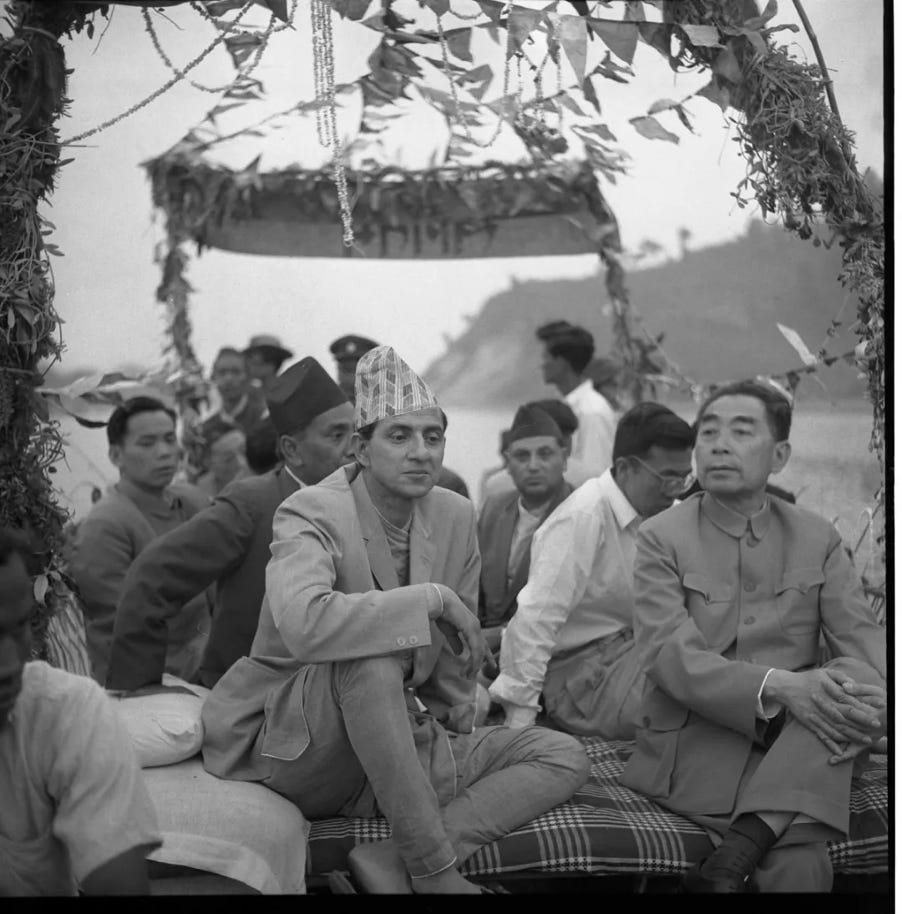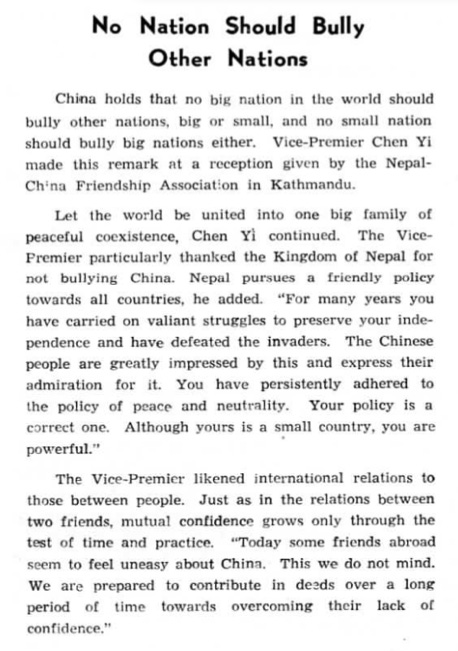65 years ago: Behind-the-scenes of Zhou Enlai's second visit to Nepal
[Free Access]Revisit Zhou Enlai's 1960 visit to Nepal from the Chinese delegation's point of view.
While this is our review content, we wanted it to become available to read for all subscribers and readers given its important historical significance, and the rare and iconic BP Koirala and Zhou Enlai’s photo in Pokhara. The photo was taken by Xinhua News photojournalist Du Xiuxian, who accompanied Premier Zhou Enlai at many of his diplomatic missions abroad. On this day (April 26th), 1960 was when Zhou Enlai came to visit Nepal to discuss boundary negotiations, and in it made a trip to Pokhara.
Enjoy reading!
The year 1960 marked a significant milestone in Nepal-China relations, characterized by high-level diplomatic exchanges, including boundary negotiations and reciprocal state visits. Five years into formal ties, the two nations were still resolving their frontier, especially the sovereignty over Sagarmatha (Chomolungma or Everest).
Carrying the spirit of the 1955 Bandung Conference, which shaped China’s outreach to Asian and African nations, Premier Zhou Enlai and Vice Premier Chen Yi included Nepal in their regional tour of six countries, including India. Zhou’s visit came shortly after Nepal’s parliament debated China’s claim over Sagarmatha and fears of communist influence. Tensions were further heightened by Indian Prime Minister Nehru’s public criticism of the Chinese delegation as they departed India.
During the Press Conference in Kathmandu, Zhou Enlai took the opportunity to express his disappointment with the Indian government when an Indian journalist asked if he was allowed to visit Tibet. Zhou asked if he was a Nepali correspondent, and upon hearing that the journalist was Indian, Zhou informed that the Indians would have to wait for some time. Adding context, Zhou acknowledged his friendly attitude at the Press Conference in Delhi, not being reciprocated by Indian Prime Minister Nehru, as they were labeled “aggressor”. “That is not an attitude to take towards guests”.
At the state banquet, Zhou subtly acknowledged the geopolitical context:
More than three years have elapsed since my last visit to your beautiful land. During this period, despite circumstances that were not entirely favorable, the friendly relations between our two countries have not suffered any setbacks, but instead have made new advances.
Numerous accounts chronicle the negotiations over Sagarmatha and the border. Zhou’s delegation visited Nepal from April 26 to 29. During this time, the Nepal side arranged a visit to Pokhara. What follows offers a behind-the-scenes glimpse from the perspective of the Chinese delegation during a trip to Pokhara.
To mark the arrival of the Chinese delegation, Nepal’s capital Kathmandu declared a public holiday on April 26, 1960, enabling citizens to line the streets and extend a heartfelt welcome to Premier Zhou Enlai and his entourage.
Nepal, being a landlocked country with minimal industrialization, was also an underdeveloped economy with limited infrastructure. Nestled at the base of Himalayan range, it was characterized by rugged terrain and a cold climate. Yet, what took Zhou Enlai by surprise was not the poverty, but the distinctive cultural ritual used to greet foreign dignitaries. Instead of presenting flowers, as was customary in many countries, Nepali honored their guests by throwing red vermillion powder (Abir). As Zhou Enlai stepped off the plane and began shaking hands with Nepali officials, the jubilant crowd surged forward, each person holding a bowl of red powder which they hurled upon the Chinese delegates and their own dignitaries alike. In an instant, the air turned crimson. When Zhou and his delegation entered the throngs along the road, they were met with an even more exuberant shower of vermillion. Soon, the entire group was cloaked in red from head to toe, even down their collars.
Some members of the delegation, unfamiliar with local cuisine, were reluctant to eat the food offered. Zhou Enlai, however, made his expectations clear:
Not eating is disrespectful. It implies dissatisfaction with the hosts’ warm hospitality.
One particularly striking cultural nuance in Nepal was a counterintuitive gesture-based communication style: nodding signified disagreement, while shaking one’s head conveyed consent. Zhou Enlai cautioned his team to remain vigilant about this, warning misinterpretations were likely if one wasn’t attentive.
Beyond the ceremony and cultural exchange, a central objective of this visit was to negotiate unresolved territorial boundary between China and Nepal, a long-standing issue with historical complexities.
Just a month prior, Prime Minsiter B.P. Koirala had visited China, Zhou and Koirala held rounds of discussions, during which they shared perspectives on the border issue and signed a preliminary agreement. Zhou’s return visit to Nepal aimed to finalize the delineation of Sino-Nepal boundary. For this critical meeting, the Nepali side selected Pokhara, a picturesque town located 96 kilometers west of Kathmandu.
Pokhara, today a thriving tourism hum, was at that time an isolated mountain retreat, known for its natural beauty but lacking modern infrastructure. There were no proper roads or airports, only a small grassy field, and the only way to reach it was via Nepal’s sole operational light aircraft. Unfortunately, this aircraft was rarely used and poorly maintained, raising serious safety concerns.
Read more about Zhou Enlai’s last wish fulfilled by Deng Xiaoping here:
Upon learning these details, Luo Changqing, Deputy Director of the Premier’s Office and close aide who had worked with Zhou Enlai since the 1930s, recommended relocating the meeting back to Kathmandu for safety reasons. Luo was one of Zhou’s most trusted confidants, and notably the last senior official Zhou met before his death.
Though Zhou Enlai typically heeded Luo’s counsel, this time he demurred:
The Prime Minister himself is accompanying me there - what problem could there be? We must respect the host’s arrangements. We must not make others feel that we, as a large country, are acting out of great-power chauvinism.
Recognizing Zhou’s resolve, Luo proposed a compromise for safety:
“Let the plane make a test flight first!”
Zhou Enlai agreed.
As fate would have it, the small aircraft broke down upon landing in Pokhara and was unable to return. The entire delegation breathed a collective sigh of relief. The test flight had thankfully prevented what could have been a diplomatic catastrophe. In the end, Nepal had to borrow a small plane from the Indian Air Force to transport Zhou and a limited number of delegates to Pokhara.
While the Indian aircraft was relatively more reliable, it could accommodate only a few passengers. Ahead of departure, each delegate had to fill out a detailed personal dossier, a precautionary measure that unintentionally heightened the atmosphere of anxiety. Some joked privately that it felt like writing a final testament.
In 1960s, Pokhara served as the summer residence of the King of Nepal. The town had no streets, no shops, and no local population, rendering it almost entirely cut off from modern civilization. Yet this untouched natural setting proved ideal for diplomacy. Surrounded by serene beauty, the talks progressed smoothly and cordially. Following the negotiations, the delegation gathered beside the tranquil lake to take a commemorative photograph.

On the evening of April 28, back in Kathmandu, Zhou Enlai and B.P. Koirala signed the historic “Treaty of Peace and Friendship between China and Nepal” and formally exchanged ratification documents concerning the boundary agreement.
The finalization of the China-Nepal border treaty symbolically transformed the world-famous Sagarmatha (Mount Everest) into a living monument of friendship between the two nations. King Mahendra lauded the accord as a milestone in the evolution of China-Nepal bilateral relations.
Shortly after this progress in Nepal-China relations, Zhou recognized the need for linguistically trained Chinese officials in the Ministry of Foreign Affairs. Hence, a group of recent high school graduates were dispatched to study Nepali in Tibet under his instruction. Among them was Zeng Xuyong, who would eventually become the only fluent in Nepali language Chinese ambassador to Nepal and would have to navigate the chaos after the Royal Massacre before he concluded his time in Nepal. Read more:
Bonus content
Premier Zhou Enlai’s Radio Address to Nepal Radio - April 28
Dear Friends of Nepal,
After a three-day goodwill visit to your country together with Vice Premier Chen Yi and other colleagues, we will be bidding farewell to you tomorrow. This visit has given us another opportunity to witness your beautiful and prosperous nation, and to meet your diligent and courageous people. We feel greatly honored and pleased.
Throughout our journey across your beautiful land - whether in Kathmandu or Pokhara - we were warmly welcomed by His Majesty the King, the government, and the people of Nepal. We were touched by the thoughtful and heartfelt hospitality extended to us everywhere. These moving scenes vividly reflect the ever-deepening friendship between the people of our two countries. On the even of our departure, we would like to once again express our heartfelt gratitude and best wishes to you. May your country prosper, and your people live in happiness.
Our two peoples have enjoyed a deep-rooted traditional friendship since ancient times. In recent years, our bilateral relations have made remarkable strides. I am pleased to report that during my visit, following further discussions between our two governments, we have agreed upon a treaty of economic and technical cooperation. This is another significant milestone in our friendship, following earlier agreements on border issues and economic assistance. The signing and future implementation of this agreement will usher our friendly cooperation into a new phase, which brings us great satisfaction.
This new development in our friendly relations is not accidental. The people of our two countries share a strong desire for mutual cooperation and goodwill. Both of our nations face challenges in economic and cultural development. In order to build our respective countries, we both long for a lasting international environment of peace. We both consistently uphold the Five Principles of Peaceful Coexistence and the spirit of Bandung. Our shared position and determination undoubtedly serve the fundamental interests of our peoples. I firmly believe that the tide of friendship and cooperation between our two nations is unstoppable. The China - Nepal friendship, like the lofty and majestic Himalayas, will stand central. The Himalayas will forever connect the hearts of our peoples.
Dear Nepali friends, we return home carrying the profound friendship you have shown us. We will certainly convey this sentiment to entire Chinese people.
Finally, please allow me once again to express my deepest gratitude to you all.
Long Live China - Nepal Friendship!









Fascinating account of Zhou Enlai, portraying him as being very respectful to and knowledgable of the culture of the country he was in.
Notice
No visits to North Korea
Why?